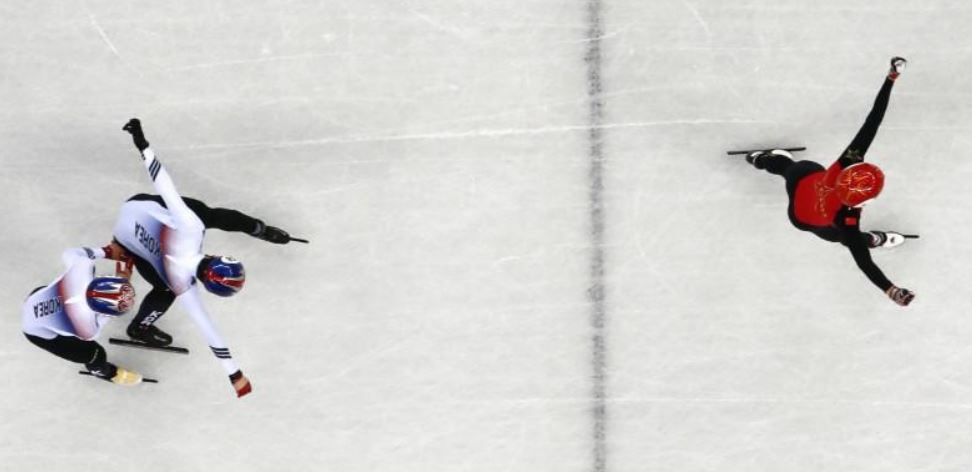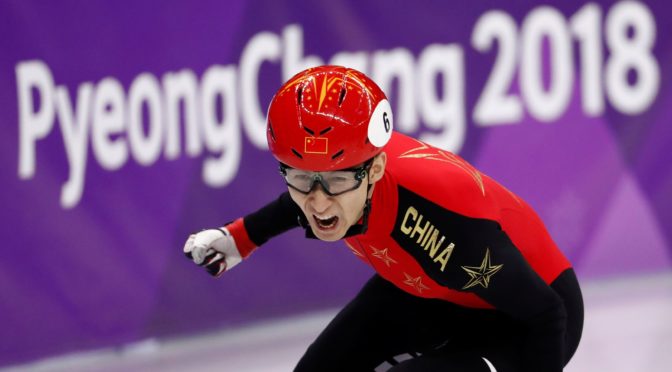Here is this week’s China Sports column for SupChina, which was first published here.
Short track world record gives China long-awaited first – and only – gold in Pyeongchang
China’s saving grace came almost at the last attempt.
Despite pre-Games talk from Chinese officials that medals would be hard to come by and that it was a real possibility China could return from Pyeongchang with no gold medals, the public has become used to feasting on Olympic titles since the 2008 Summer Games. With three won in Sochi four years ago, and some of the more reliable prediction algorithms tipping Chinese athletes to win six events, expectations were high with the long build-up to 2022 increasing interest this time around.
But, event by event, China just didn’t have the golden touch.
The first medal – a silver – came on Day 4 in the ladies’ halfpipe, though with Korean-American teenage star Chloe Kim as strong a favorite as any at these Games, second place was a victory of sorts for Liu Jiayu. Two days later, Sui Wenjing and Han Cong finished agonizingly less than half a point behind the German duo in the pairs figure skating competition to net another silver, while Zhang Xin and Kong Fanyu both finished on the podium in the ladies’ aerials on Day 7, but neither stood on the top step.
Short track speed skating delivered on Day 8 – another silver, to Li Jinyu in the ladies’ 1,500m – but it was the events where China failed to finish in the top three that really captured the imagination – and sparked the rage – of the nation.
Short track is the Fast and the Furious of the Olympics and is notoriously unpredictable with collisions, crashes and resulting penalties more often than not deciding key races. Britain’s Elise Christie, for example, is one of the best on the planet and a multiple world champion, but has crashed out in six successive Olympic races in which she has had genuine medal hopes – disqualified in five of them.
But for the expectant Chinese public – instant armchair experts, like 99% of those watching Olympic events – there was something fishy going on. Time and again, they saw Chinese skaters being penalized, while their Korean counterparts were given a pass. Meanwhile, the host nation racked up three golds and six medals in total medals in short track competition.
It all came to a head in the women’s 3,000m relay final when an incident between a Chinese and a Korean skater left the Chinese team disqualified, giving the Koreans their third short track gold of the Games. A Chinese appeal was rejected because it came after the 30-minute cut-off following the race, but according to Chinese coach Li Yan – who herself won short track silver at the 1992 Olympics – the referees were in a meeting right after the race so the team hadn’t been able to submit their appeal.
The International Skating Union (ISU) then took the unprecedented step of explaining the decision on its website, posting a picture which clearly showed China’s Fan Kexin impeding Korea’s Choi Min-jeong. But viewers later posted their own screenshots of the race, which appeared to show a Korean skater holding back a Chinese rival. Canada, who had briefly taken the lead with six laps to go, was also disqualified for clashing with Korea.
This latest affront was simply too much for many to bear, with parallels made online to South Korea’s suspiciously fortunate run to the semi-finals of the 2002 FIFA World Cup – again on home soil – while others even called for ISU officials to be banned from entering China for the 2022 Olympics.
China still raging about disqualification in last night's short track relay, though calls like this are ridiculous. https://t.co/Oan2UHmjp1
— Mark Dreyer (@DreyerChina) February 21, 2018
Relay member Zhou Yang, who has won three gold medals across the past two Winter Games, made a pointed remark after the race, saying the Beijing Olympics in 2022 “will definitely be fair”.
A more measured response, however, had earlier come from Yang Yang, an IOC member and China’s first ever Winter Olympics gold medalist, who noted that the ISU had made some rules adjustments in recent years, but concluded “the penalties that China received show that we don’t understand the rules well.”
Then, on Thursday evening, Wu Dajing absolutely blitzed the competition in the men’s 500m to give China its first gold of the Games. Wu won in a world record time, claiming China’s tenth short track gold medal in history – but the first to be won by a man. He remarked wryly afterwards that he wanted to lead from the front so as not to give either his competitors or the judges a chance to disrupt his race.

China could well have doubled its gold medal tally less than an hour later when Wu and three teammates were pipped at the post by underdogs Hungary in the men’s 5,000m relay.
China’s final medal total of one gold, six silver and two bronze medals is the same number, nine, as in 2014, though significantly China won three golds in Sochi. However, Wu’s magic moment meant the Chinese national anthem was finally given an official airing in Pyeongchang, and provided a closing high as the focus now turns towards 2022.
Somewhat cryptically, Wu said afterwards his two medal-winning performances that he planned to celebrate “in the Chinese traditional style and it’s a secret.”
That would imply he’ll be on the baijiu this weekend – the only question is whether he will wait until after his flag-bearing duties at the closing ceremony.
Also in this week’s China Sports Column:
- Australian former aerials-skier-turned-TV-analyst Jacqui Cooper backtracks after implying she can’t tell any of the Chinese athletes apart.
- NBA player JJ Redick appears to slip in a racist slur as part of his Chinese New Year message.
To read about these stories in full and find other China-related links to topics including Wanda‘s switch in football strategy, reports that AC Milan‘s Chinese boss Li Yonghong is broke and ping pong unlikely debut with the New York Philharmonic, click here to read the column in full over at SupChina.


